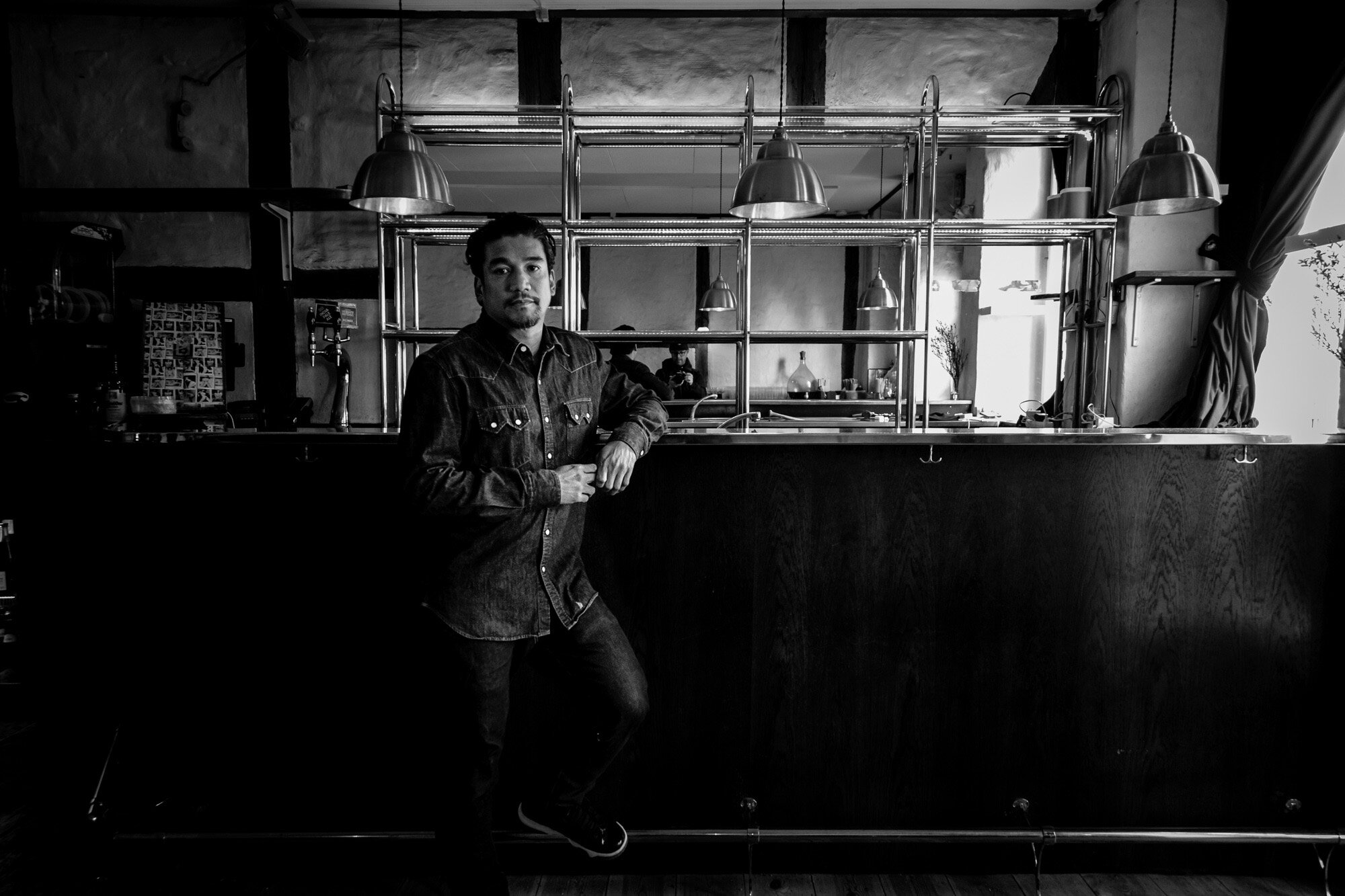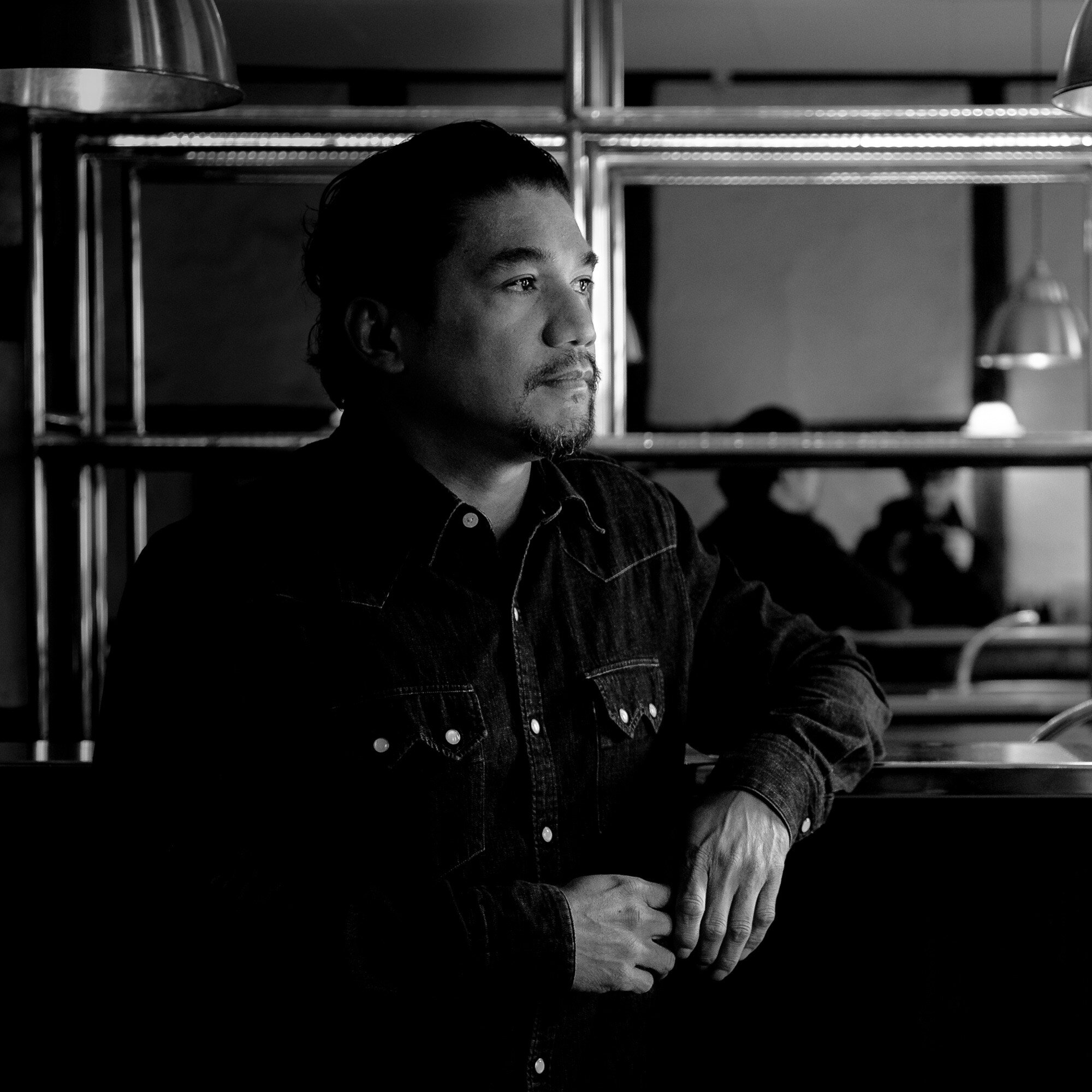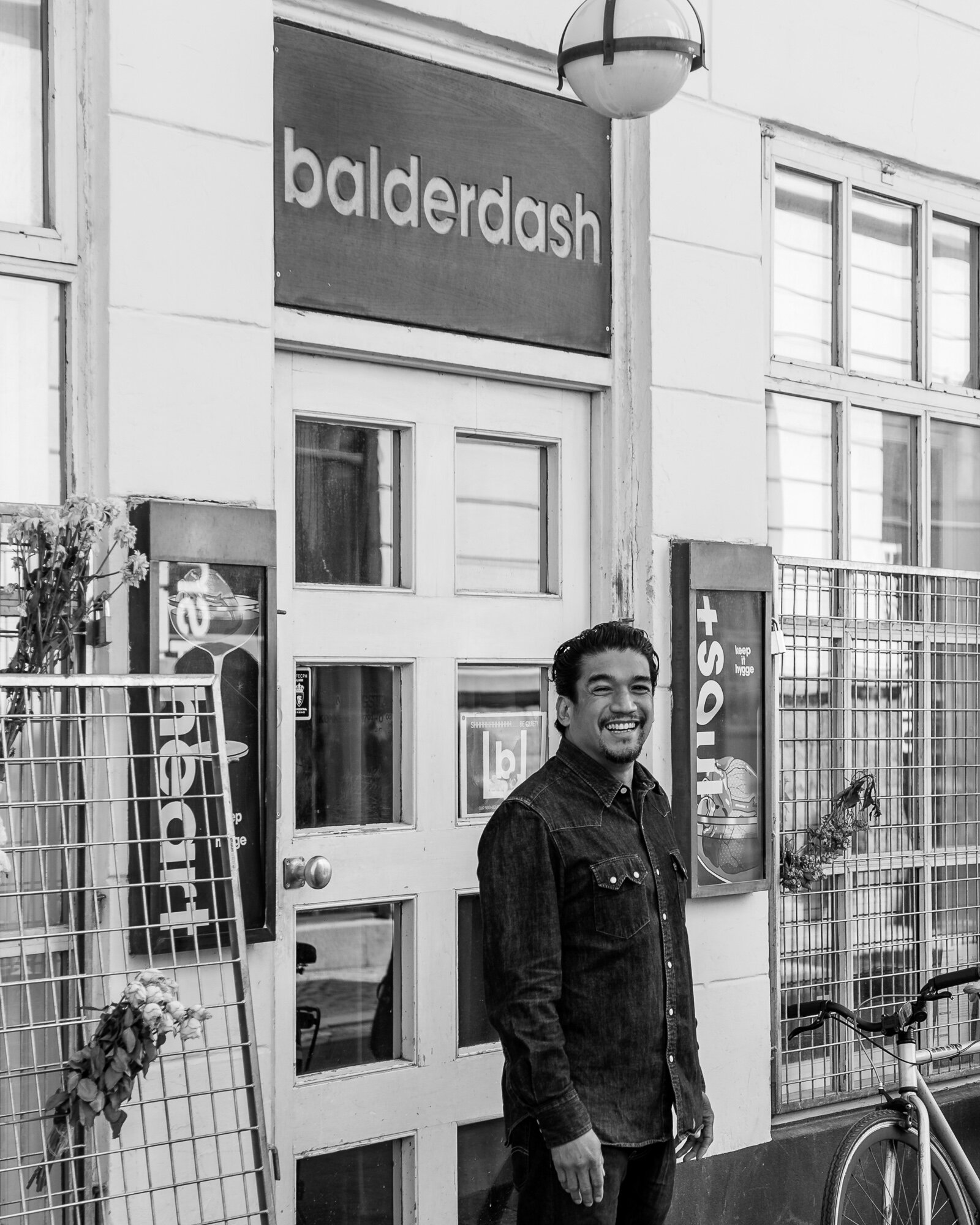
Closed // Open
with Geoffrey Canilao - Balderdash
If you’ve ever come across Balderdash’s instagram, and viewed their stories, it gives you a pretty good idea of what a typical night there is like. Geoffrey Canilao has created not only one of the more lively nightlife spots in Copenhagen, but one that also dips its toes in the culinary world with cocktail builds that don’t sound all that dissimilar from a restaurant menu. Ingredients like sichuan dust, clarified milk curds, and squid ink are not uncommon. And, if you want a boozy ice cream dessert, they have those from time to time as well. It’s a place that has built a following around its jovial atmosphere with Canilao being the architect, leading his guests nightly with the house motto, proudly printed on each coaster, “Keep It Hygge.”
I swing by Balderdash, located in a historic building in the city center, to catch up with Geoffrey. Inside, the shelves behind the bar, usually jammed with bottles of various spirits, are now empty, with nothing more than mirrors reflecting the two of us standing inside a now very quiet version of Balderdash. It’s disarming to see it so bare.

CS - For those who know Balderdash, you’re the face, the heartbeat of this place. You and Balderdash seem inextricably linked. When you made the decision to close, and you wrote that Instagram post, what was going through your mind?
GC - Well, obviously the first thing that goes through your mind is the safety of the people around you. It has to start with yourself, your family, then your staff and the people around you that have been supporting you. That’s the way I dealt with it. After that, I was just trying to figure things out. It was important to identify what I can control and what I can’t control. Safety was first.
CS - So in a sense it was a moral obligation.
GC - Yes. For us, closing earlier, closing before the lockdown, it was an obligation to do that. Not just for me, but also for my staff and the guests. We wanted to send that message out. Safety is paramount. What we do is tactile, we eat, we drink. So we were trying to be safe. This is just what we do. We care about the people that come here. Not just what they drink, but their livelihood, we want them to come back. We don’t want them to feel skeptical in terms of a health situation.
CS - I get the sense from previous conversations we’ve had that Balderdash is more than a bar to you, it’s a realized version of the bar you’ve always wanted. In talking with hospitality people, it seems that’s often the case, that there’s often extremely personal investment into projects. Do you think that makes the toll of something like this more acute?
GC - Yeah, of course. Because you’re expressing yourself every day. It’s in the public forum. It’s hard to go private. Our private lives are out there now. It’s all intertwined. I love what I’ve done, I’m proud of what I’ve done. I’m not a fan of the Jante law. [laughs] So yes, it’s taken a toll. In both my private life and my business life. For me, I couldn’t do anything else. Other people can, but for me, in order to stay alive in the industry, I needed some form of personal expression.
CS - It seems like immediately needing to shut it down could take a toll, because it’s such an expression of you.
GC - It is, but it’s also a time for personal reflection. It’s easy to start a business plan, but the hardest thing for us [industry professionals] is, we don’t usually look for exits, ways for us to get out. I can’t say I’m smart or wise, but I’ve been looking at exits, if this doesn’t work out. At the end of the day, I just need to express myself, no matter what form. That could be consulting, painting, through making my own ciders or kombuchas, who knows?! [laughs] I’m always looking for projects. At the end of the day, if Balderdash closes during this pandemic, I need to have some form of self-expression. That could be on a canvas or in a cocktail glass. All of those things are being questioned at this point. As part of self-reflection, you start off looking back, then you look at now, then you have to force yourself to look into the future as well.
CS - You’re often just looking at how to support the business currently.
GC - Yeah, for us, unfortunately, our timeline is always short. You’re always looking day-to-day or week-to-week. The way our finances are, it’s month-to-month. Not going to lie, it might be day-to-day. The market is like that and that influences your thinking. This time off has forced us to think a little differently. Because we’re so used to thinking “Oh am I going to make it this week?” You're always thinking about this week. But now that I have this time, I start thinking about Geoffrey in his 40s, Geoffrey in his 50s, Geoffrey in his 60s. I can see that a little bit now.
CS - So in a way it’s afforded you an opportunity to think about the future.
GC - Yes. Your mind goes into that realm of thinking because you have the time. I’m not saying I have a lot of time because I’m worrying about the bar all the time. But you see things differently. I have time, but I still don’t have enough time. [laughs]


CS - You pointed out that a lot of attention had been given—and rightly so—to recognize the extremely tenuous situation restaurants found themselves in, but to not forget about your neighborhood bars who were also facing unprecedented challenges. Did you feel like bars were perhaps getting lost in the shuffle a bit?
GC - I always think we [bartenders] get lost in the shuffle. My opinion. Not to make myself self-important. We’re such a social environment. People forget that we have influence in how people think and how people see the world. Chefs are necessary because food is sustenance. I think the chefs have mobilized a lot faster, forming alliances and forming movements in order to save their industry. But for us, we haven’t done that as well. And, you know, it’s a little bit like “hey guys, don’t forget us, we’re part of it.” Not just me, but all of us—baristas, bartenders—we’re all part of this world, this industry.
CS - I remember when you posted that, I sat and I thought about it, and it occurred to me that, back in New York, for every restaurant I ever went to, I probably went to three bars. What I mean by that is, I probably spend a lot more time at bars than I do restaurants. Even if that’s just stopping in for a beer after work.
GC - Yeah. I think when I made that post, it was just the way I was seeing social media at the time. Chefs were a lot louder than bar [owners]. And rightfully so, because they have a bigger audience. The audience for bars is much smaller.
CS - Everybody has to eat, not everyone has to drink.
GC - Exactly. I just wanted to say don’t forget us. That we’re part of this industry. When people go out for dinner, they often end up at a cocktail bar.
CS - There’s talk of restrictive openings for places like restaurants initially. How does that impact a bar like Balderdash, where by design it’s smaller and more intimate. Do you think the government needs to take a closer look at how that impacts bars versus restaurants?
GC - Regarding laws and packages, yes, they have to really look into how the place functions. For us, it’s freeform. That’s a big difference. People are coming in and coming out. Bars have been adapting restaurant mentality, with reservations and seatings, but that’s not the way I see the spirit of a bar, the spirit of socializing. It’s a challenge, if the government doesn’t see the difference. It’s a challenge, but also an opportunity. We can be flexible. The strategy will be the same, but the tactics will be different.
CS - When you’re allowed to open again, with this being a smaller, intimate place, do you think they’ll allow drinks outside for instance? Things to allow you to operate and be successful, knowing that what goes for restaurants may not apply here, at a bar?
GC - Hopefully so. The Danish government should understand that. They’ve invested so much money into tourism, food and nightlife. You don’t want to see all of that money invested be for nothing due to this crisis. I hope they see us as a long-term investment.
CS - I’ve seen bars in New York City for example that started offering pre-made take-away cocktails. Did you ever consider doing something like that with Balderdash’s cocktails?
GC - Of course. I’m trying to hustle all the time! [laughs] But me keeping quiet was due to the packages, I wanted to understand the packages first. That would affect my packages. For us, it was important to assess the situation before we made any moves. It kills me every day that I’m not doing anything. For one, it’s something for me to do. Two, it would be money coming in. And three, those are marketable social media items that I could put out there. My brand awareness.
“Every day there’s that sadness, that anxiety, whether I’ll make it. Whether people will come back. Whether my business will come back.”
— Geoffrey Canilao
CS - If I recall correctly, you opted to close at the request of the government before there were talks of compensation packages. That’s a huge amount of trust. How did that feel initially, placing the future of something you’d worked so hard to create in the hands of the government without really having any idea of what would happen?
GC - That was part of the equation when opening the bar. When you invest in a place, you have to invest in how the government runs the market. I did have a positive outlook on how the Danes would handle this. The way the social system works here, that factored into my decision. They take care of people. Things like that factor into this.
CS - It didn’t make it easier, but made you feel better, more comfortable.
GC - Comfortable is probably a better word. Every day there’s that sadness, that anxiety, whether I’ll make it. Whether people will come back. Whether my business will come back. But it’s comfortable knowing that I have better footing, to get back to that position, than many other countries.
CS - I assume you took a package and if so, did that alleviate some stress, allow you to breathe a little easier?
GC - Yeah, of course. You want to take care of your people. It allowed me to breathe knowing that my staff was getting some money, getting some sleep. It made me think about my guests, that they’re okay at home and getting some help. The hard part has been the unknown. But things are getting clarified, dates are coming out, you’re getting timelines. They help me plan.
CS - Finally, we’re a number of weeks into this. What have you been doing to keep yourself happy, what are some bright spots you’ve identified through all of this?
GC - The bright spots are, I’m very grateful to be in Denmark. For my business. That’s my outer persona. I’m very grateful I can do what I do. Seeing my friends in New York, it’s not easy to see them struggle. But it makes me very grateful for where I’m at. This has made me refocus on what’s important. I’ve been working out a lot. My running has gotten a lot better. Intellectually and spiritually, I’m getting back into art and philosophy. I kind of forgot that. I started off as an art student. I had forgotten about that. Now I’m wondering if I can combine that and bartending. I’ve been cooking a lot. I missed that. I didn’t have any time to do it. I’m here every day. It’s been nice to get back into that a little bit. And I don’t want to discard this. I want to come out of this and not forget about that. I want to keep this going. I wonder “how can I keep this going?”
“I’m always looking for projects. At the end of the day, if Balderdash closes during this pandemic, I need to have some form of self-expression. That could be on a canvas or in a cocktail glass.”
— Geoffrey Canilao

